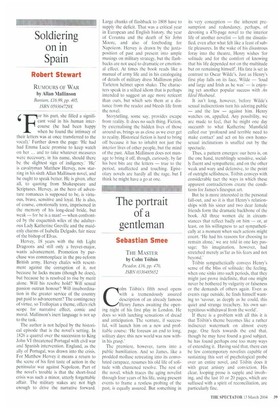Soldiering on in Spain
Robert Stewart
RUMOURS OF WAR by Allan Mallinson Bantam, £16.99, pp. 405, ISBN 059304729X , or his part, she filled a signifi
cant void in his human inter cant void in his human inter course (he had been happy when he found the intimacy of their letters was at once transferred to the vocal); Further down the page: 'He had had Emma Lucie promise to keep watch on her ... and to take whatever measures were necessary, in his name, should there be the slightest sign of indigency."He' is cavalryman Matthew Hervey, now starring in his sixth Allan Mallinson novel, and he ought to speak better. He is given, after all, to quoting from Shakespeare and Scriptures. Hervey, as the hero of adventure romances is supposed to be, is virtuous, brave, sensitive and loyal. He is also, of course, emotionally torn, imprisoned in the memory of his long-dead bride, but weak — for he is a man! — when confronted by the coquettish wiles of the adulterous Lady Katherine Greville and the maidenly charms of Isabella Delgado, fair niece of the bishop of Elvas.
Hervey, 18 years with the 6th Light Dragoons and still only a brevet-major, wants advancement. Promotion by purchase was commonplace in the pre-reform British army. Hervey chafes with resentment against the corruption of it, not because he lacks means (though he does), but because he is resolved to rise by merit alone. Will his resolve hold? Will sexual passion outrun honour? Will insubordination in the greater service of the country put paid to advancement? The contingency of virtue, so Trollopian a theme, offers rich scope for narrative effect, comic and moral. Mallinson's inert language is not up to the task.
The author is not helped by the historical episode that is the novel's setting. In 1826 a quarrel over the succession to King John VI threatened Portugal with civil war and Spanish intervention. England, as the ally of Portugal, was drawn into the crisis. For Matthew Hervey it means a return to the scene of his first taste of action in the peninsular war against Napoleon. Part of the novel's trouble is that the short-lived crisis was such a minor, utterly forgettable affair. The military stakes are not high enough to drive the narrative forward, Large chunks of flashback to 1808 have to supply the deficit. That was a critical year in European and English history, the year of Corunna and the death of Sir John Moore, and also of foreboding for Napoleon. Hervey is drawn by the juxtaposition of past and present into ample musings on military strategy, but the flashbacks are not used to dramatic or emotional effect. At times the book reads like a manual of army life and in his cataloguing of details of military dress Mallinson piles Tarleton helmet upon shako. The characters speak in a stilted idiom that is perhaps intended to suggest an age more reticent than ours, but which sets them at a distance from the reader and bleeds life from the novel.
Storytelling, some say, provides escape from reality. It does no such thing. Fiction, by externalising the hidden lives of those around us, brings us as close as we ever get to reality. Historical fiction is hard to bring off because it has to inhabit not just the interior lives of other people, but the mind of the past. Allan Mallinson does not manage to bring it off, though, curiously, by far his hest bits are the letters — true to the period, unaffected and touching. Epistolary novels are hardly all the rage. but I think he might have a go at one.


































































 Previous page
Previous page